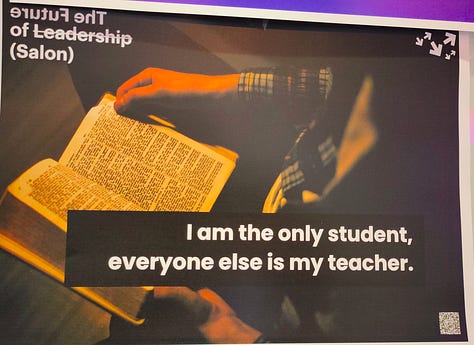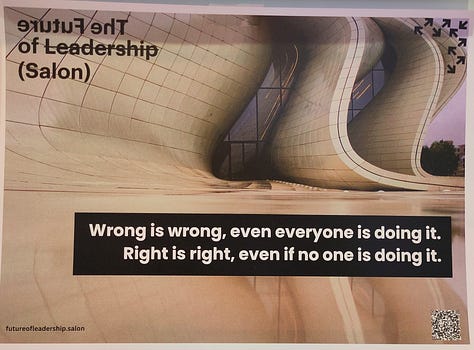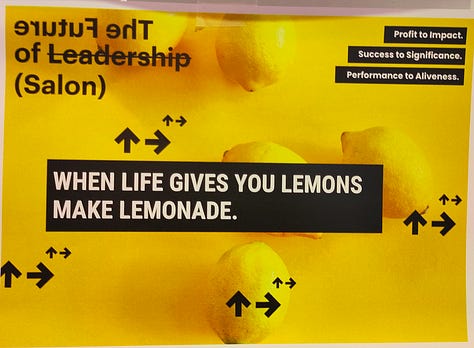For your review and feedback ...
First DRAFT of my article for the #futureofleadership salon magazine



“The 3 C’s of Life: Choices, Chances, Changes. You must make a choice to take a chance, or your life will never change.” ― Zig Ziglar
Who am I
The 3 C’s plus some luck (being at the right place at the right time and making the right call) did bring me from a Mechanical Engineering graduate in 1989 to an Executive MBA student in 2025 with the age of 62. Lifelong learning, being open for new topics, and trying out disruptive approaches, was helping a lot during this journey. I was an introverted generalist with cross-functional interest in different subjects and groups of people in school and this did not change over time. Attitude is mostly fixed, but my core believes are flexible, see the current ones → „Do the right things right – Start simple and Keep it simple - Steal with Pride - Copy & Transfer – have an Agile mindset, always able/willing to change/adjust – do not worry too much about stuff you cannot influence anyway“.
The Future of Leadership Salon
This growth mindset did bring me in contact with the #futureofleadership salon in 2018 for the first time and I did join again in 2019, 2020, 2022 and 2024. As I am writing a BLOG since 2016, a job change did trigger this new way of note taking and sharing ideas, I could easily find my summaries of the five different salons that I could join so far. Asking Microsoft CoPilot to summarize my BLOG posts about the salons and to search for recurring themes did bring the following AI generated conclusion:
„the future of leadership lies in embracing human-centric approaches, fostering innovation, and acting with a global mindset. By prioritizing empathy, adaptability, and purpose-driven work, leaders can navigate the complexities of the modern world and drive meaningful change.“
A pretty good summary of what I have experienced during the salons, and what the thought leaders and participants are standing, respectively looking for.
“You are the average of the five people you spend the most time with.” — Jim Rohn
Besides people like Warren Buffet, Simon Sinek, Jurgen Appelo, and my experience during two outplacement processes, Eve Simon was always a role model and thought leader, who I was closely following since 2018. So it is a pleasure for me to support her with an article about a topic that I covered some weeks ago in my BLOG. It is a combination of the following issues:
Baby Boomers like me will be leaving companies and the work force in the next 5+ years. An exodus in retirement systems and for expertise development. As the retirement systems are weak and rely on many workers to pay into it every month, we are asked to work beyond age 67 in Germany. But there are less jobs available and a missing appreciation for the knowledge and experience we bring to the table. In parallel we still have to overcome the already existing IT talent shortage.
AI is more and more eliminating traditional career entry positions, so it will be difficult to gain experience for Juniors and Young Talents → challenges for traditional career ladders and skill acquisition.
A significant and evolving policy discussion revolves around "AI taxation" or a "robot tax". This concept aims to disincentivize firms from replacing workers with machines and to redistribute the wealth generated by AI to fund social services, potentially bolstering pension systems and reducing wealth gaps.
What is the real impact of AI at work? How little time are workers saving with AI, according to a huge new study? The need for reimagined education focused on continuous learning and human-AI collaboration, and ethical AI governance frameworks to ensure technology serves human well-being rather than exacerbating inequality.
We need a cross-functional and end-to-end approach here
Let’s finally stop the common silo thinking and the old ways of Management (do things right) and Leadership (do the right things). It is time for #futureofleadership, human-centric and purpose-driven.
As AI usage, capabilities, expertise/experience, pros and cons, best practices and lifelong learning is a hype topic, I am into it as well, but what is in it for me?
For this article topic I did start with the following prompt „Young talents and junior positions are replaced by AI and baby boomers are leaving the work place in the coming years. What will be the consequence for retirement system and the possibility to develop expertise and experience?“ and initiated a Google Gemini Research. The result was a 15-page document including two pages with detailed references. As a 2nd step I did ask Antrophic Claude to summarize the research result into five key messages, really impressive. The AI tools are getting stronger every day, but not every tool fits to every use case or matches your personal needs for 100%. There are helpful sites like e.g. BestfreeAIWebsites or the Matt Turck blog that can help.
Your personal experience and opinion counts as well, but you better start with topics you understand and can judge, as AI imagination is still an issue.
„Manage the System, Lead the People“ – Jurgen Appelo
Like a Gardener or Chef, you should be mixing the best possible ingredients out of experience, and let it grow or cook. Also an approach that is human-centric and purpose-driven. Both have a clear end-to end perspective, from sowing to harvest, or from purchasing the ingredients to deliver the final meal to the customer.
We could use the same approach for the topic and AI? An end-to-end perspective and best possible understanding of all dependencies along the way. Let’s start with the impact of the Baby Boomers on the German retirement system. In simple sentences – the workforce pays a % of their salary into the system and the same money gets paid out to the retirees. The government saves money for the future in good times and adds tax money in bad times, to guarantee an ongoing pension payment. Due to demographical reasons the Baby Boomers will be retiring in the coming years and put high pressure on the system, as the ratio between payers into the system and people benefiting from the system is dramatically changing. The retirement system needs enough young people in the workforce, preferably with good salaries, to keep the machine going. When AI is more and more taking over entry positions and jobs, the young people will have issues to first find a job, build experience over time and take over the knowledge from the Baby Boomers leaving. A smaller workforce with lower salaries will make the retirement system problem even worse.
Countermeasures like e.g. taxing AI systems and AI usage, or asking the Baby Boomers to work beyond the current retirement age of 67, does show a lot of issues I mentioned before – silo thinking, no end-to-end approach, avoiding to think about dependencies and a human-centric and purpose driven approach. „We cannot solve our problems with the same thinking we used when we created them.“ – Albert Einstein
Time for a new approach? #futureofleadership – leaders from e.g. non-traditional careers, with different backgrounds (e.g. Moms lead), a diverse set of cultures, believes, age, people who are willing to change themselves before they want to change others. Gardener or Chef like characters, who are preparing the best possible environment/system for self-organized/managed teams, who are supposed to be working in there successfully and solving the problems at hand. And we should not forget about AI.
Let’s make use of the AI technology in a sustainable and responsible way - „human“-centric and purpose-driven as well. Like any other team member, with strengths and weaknesses, special capabilities and different ways to approach a problem. Finding the right balance between, what is technically possible and currently makes sense for the topic we want to solve. Just be realistic and avoid to follow any new crazy trend that is just wasting your time. The rest you will have to learn on the way, as always.

